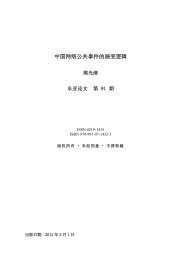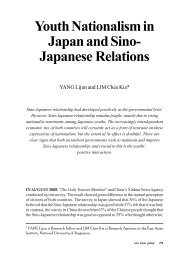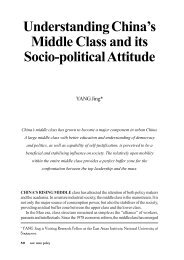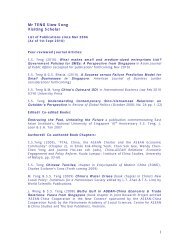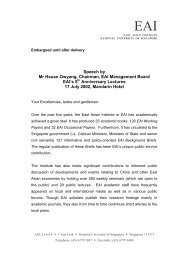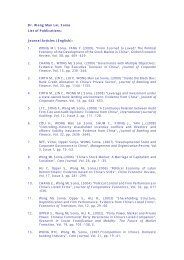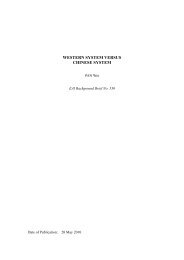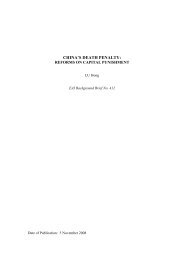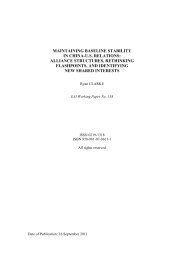IN FOCUS - East Asian Institute - National University of Singapore
IN FOCUS - East Asian Institute - National University of Singapore
IN FOCUS - East Asian Institute - National University of Singapore
Create successful ePaper yourself
Turn your PDF publications into a flip-book with our unique Google optimized e-Paper software.
<strong>IN</strong> <strong>FOCUS</strong><br />
Marriage Revolution in <strong>East</strong> and Southeast Asia: Why do People Stay<br />
Single in <strong>Singapore</strong> and China<br />
Friday, 6 January 2012 Among the young generation <strong>of</strong> Chinese <strong>Singapore</strong>ans, marriage is<br />
not considered a necessity and should only be committed into voluntarily, and not urged<br />
into by family or society. Whereas singles in China face more social and familial pressures to<br />
get married and are also likely to regard marriage as essential in their lives.<br />
Dr Zhang Yanxia, visiting research fellow <strong>of</strong> <strong>East</strong> <strong>Asian</strong> <strong>Institute</strong> at the <strong>National</strong> <strong>University</strong> <strong>of</strong><br />
<strong>Singapore</strong>, gave an engaging narrative <strong>of</strong> her preliminary findings from a recent qualitative<br />
study conducted in <strong>Singapore</strong> and two major cities in China, Shanghai and Beijing, with 100<br />
never-married ethnic Chinese. Dr Zhang conducted the study as an attempt to explain the<br />
rising trend towards late marriage and singlehood in <strong>East</strong> and Southeast Asia over the past<br />
three decades.<br />
Dr Zhang presented a historical review <strong>of</strong> singlehood trend in China. The first wave <strong>of</strong><br />
singleton occurred in the 1950s with the enactment <strong>of</strong> the first marriage law that abolished<br />
arranged and forced marriages, resulting in the rash <strong>of</strong> divorces. The second tide was<br />
between the 1950s and 1970s, when a mass <strong>of</strong> young intellectuals were sent to the<br />
countryside for education through manual labour, but later divorced their rural wives in<br />
order to return to their urban homes. Love marriage has since become widely acceptable in<br />
the early 1980s. Hence, the third singleton tide arose in the 1990s as people chose to be<br />
singles in order to experience the freedom <strong>of</strong> love. The fourth wave <strong>of</strong> singleton was<br />
attributed to women’s higher education and greater financial independence.<br />
Dr Zhang’s study has shown that <strong>Singapore</strong> has higher proportion <strong>of</strong> singles in the 30 to 40<br />
years old age group than in China. Also, <strong>Singapore</strong> has one <strong>of</strong> the highest singlehood rates<br />
among <strong>Asian</strong> countries.<br />
For <strong>Singapore</strong>ans who do get married, marriage ages have risen, whether male or female,<br />
by at least three to four years compared to 30 years ago. In 1970, the mean age <strong>of</strong><br />
marriage for <strong>Singapore</strong>an women was 24.2, and increased markedly to 28.7 in 2010. For<br />
men, the average age was 27.8 in 1970, which increased to 30.9 in 2010.<br />
In China, singlehood rate has remained fairly constant. However, in economically developed<br />
major cities, such as Beijing and Shanghai, a sharp increase in the number <strong>of</strong> singles and<br />
“shengnu”, which literally means “leftover” females, is observed.<br />
One <strong>of</strong> the attributing reasons is the expansion <strong>of</strong> education and employment opportunities<br />
for women. With higher level <strong>of</strong> education, women are more aware <strong>of</strong> their rights, individual<br />
choice and gender equality in the society, thus empowering them greater freedom,<br />
aspiration and economic independence.<br />
Increasing uncertainty in labour market, long working hours, high living expenditure, high<br />
work and lifestyle stress, increasing divorce rate, individualism, etc., are other attributing<br />
reasons to the singlehood phenomenon in <strong>Singapore</strong>, Beijing and Shanghai.<br />
The diminished desire for childbearing in women is also a main reason why women put <strong>of</strong>f<br />
marriage and motherhood, which are opportunity cost to their career development.
Dr Zhang’s survey on the attitude towards marriage has shown that most <strong>Singapore</strong>ans<br />
regard marriage as a personal desire instead <strong>of</strong> a social and familial duty, whereas majority<br />
<strong>of</strong> respondents in China regard marriage both as a personal desire as well as social and<br />
familial duty. This therefore explains why singles in China, especially women in their late<br />
20s, face persistent social pressure to marry. <strong>Singapore</strong>an singles will not lower their<br />
expectation <strong>of</strong> an ideal partner for the sake <strong>of</strong> getting married and they believe marriage<br />
should be entered into voluntarily. The economics <strong>of</strong> marriage, increasing cost <strong>of</strong> marriage<br />
ceremony, housing and childrearing are major deterrents to <strong>Singapore</strong>ans from jumping<br />
into marriage.<br />
Pertaining attitude towards relationship, there is a wide acceptance <strong>of</strong> premarital sex and<br />
cohabitation in both <strong>Singapore</strong>an and Chinese respondents. Cohabitation is more prevalent<br />
in major cities <strong>of</strong> China than in <strong>Singapore</strong>. The majority <strong>of</strong> respondents in both countries<br />
agree that marriage is compulsory in order to have children, but a high proportion <strong>of</strong><br />
<strong>Singapore</strong>an respondents feel that having children is not critical and certainly not a<br />
determining factor in marriage.<br />
Despite rising materialism in China, traditional gender norms, which have powerful influence<br />
in mate selection, are deeply rooted and still perpetuate the society. Surprisingly, traditional<br />
gender expectation remains quite strong in <strong>Singapore</strong> as well.<br />
In <strong>Singapore</strong> and China, education and economic hypergamy is a long-held practice, in<br />
which women marry up, to men <strong>of</strong> equal or higher income, education, social status and age,<br />
and men marry down. This means that there is a marriage squeeze for the less-educated<br />
males and higher-educated women, and that the most highly educated women <strong>of</strong>ten end up<br />
on the shelf without partners. Age is also an issue in China, where men prefer younger<br />
women. In <strong>Singapore</strong>, age is less <strong>of</strong> an issue as mean age gap between men and women is<br />
about five years.<br />
The lack <strong>of</strong> effective matchmaking agencies may be one reason why the alleviation <strong>of</strong><br />
singlehood problem in <strong>Singapore</strong> remains a great challenge. The Social Development<br />
Network (SDN) is the sole matchmaking institution run by the <strong>Singapore</strong>’s government, in<br />
partnership with private matchmaking agencies providing services support.<br />
However, <strong>Singapore</strong>ans have yet to warm up to the idea <strong>of</strong> being introduced or arranged<br />
due to social stigma. The rising cost <strong>of</strong> engaging dating agencies is also another factor why<br />
matchmaking is unpopular.<br />
On the other hand, dating and matchmaking are vibrant with huge market potential in China.<br />
Online dating sites and private agencies organise myriads <strong>of</strong> luxury dating activities and<br />
services at a premium to Chinese singles. These private marriage agencies in China,<br />
however, are not without complaints from the public due to a lack <strong>of</strong> regulation and<br />
supervision from the government.<br />
Dr Zhang concluded that that there is no sharp distinction between <strong>Singapore</strong> and China as<br />
to what extent non-marriage is voluntary or involuntary. The choice to remain single varies<br />
in life stages <strong>of</strong> individuals and the survey indicates 30 years old as the “magic age” for that<br />
turning point. As widely acknowledged, more singles are in fact feeling happier with their<br />
singlehood status.



